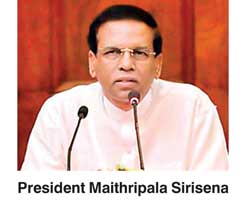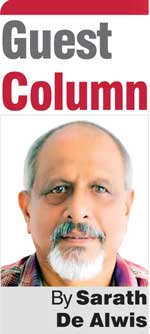Monday Feb 16, 2026
Monday Feb 16, 2026
Wednesday, 10 February 2016 00:00 - - {{hitsCtrl.values.hits}}
The best and the brightest of the academic and activists who supported the common candidacy of President Sirisena have decided to refresh presidential remembrance of his covenant on good governance announced prior to the presidential election. 
The three-page letter in elegant, eloquent Sinhala seems to suggest that promises not kept are deemed as ‘broken’. Their sense of disillusionment is expressed with extreme economy, an indication that they still cling to their pre-election aspirations for good governance and transparency.
This missive to the President exposes the dichotomy between the comprador and hierarchical economics of the administration and the indigenous, alliance economics of the reform centric civil society who claim a stake in the Maithripala Sirisena presidency.
What they advocate is to be secure in the enjoyment of our own means of subsistence and development first. External borrowing is not dictated by dogma but resorted to under unavoidable compulsions. The tone is aggrieved. The emphasis is on the sense of dejection and despair.
“There is not the slightest apprehension in our minds that you have unremembered the solemn pledge you made before the presidential election on 8 January 2015 with regard to the corruption and wrongdoings in financing infrastructure development. A scrutiny of various measure taken by the State in this regard drives us and many others in to a state of utter bewilderment. The purpose of this communication is threefold – to express our sense of bewilderment, to explain why we are bewildered and to offer our counsel.”
The academic and civil society coalition that now finds itself orphaned makes a compelling case for “observing the cardinal principles of good governance to ensure optimal returns on investments in infrastructure development by harnessing indigenous expertise, dexterity and craftsmanship”.
What they suggest may not be to what was prescribed by George Soros and Ricardo Hausmann. Yet, what they suggest makes eminent common sense. Structural transformation, competitiveness and social inclusion call for indigenous enterprise.
They insist that a country with depleted resources and a heavy debt servicing burden cannot and should not be cavalier in its disregard for due diligence in public investment.
“Extreme care should be taken to ensure maximum capital efficiency in terms of returns and productivity when investing in major infrastructure projects.”
Our national economic strategy should offer the space and the incentives to local enterprises to contribute towards the country’s development needs.
It would then enable local institutions to constructively participate in infrastructure development projects. The demand for services will accrue to the domestic economy with its attendant multiplier effects.
If and when local construction and expertise is found inadequate for the task or procurement from abroad is unavoidable, the most advantageous terms must be negotiated.
Competitive procurement procedures should be strictly followed. The procedure adopted should be transparent. That alone will reduce room for corruption, waste and mismanagement.
These parameters were discussed and deliberated ad nauseam prior to the Presidential election. What we now hear, learn and discover is altogether different. Projects appear to be offered on negotiated terms with no tenders being called. These are being funded through bi-lateral credit. These credit lines negotiated previously were expensive and most unfavorable to our country.
Projects in several sectors are now offered as evidence of this assertion according to news reports. The matter of Railways is of particular interest. We have a proven track record of having efficiently and economically constructed railway tracks in the post-tsunami recovery projects. That was also a time of war. Today in the post-war development initiatives we continue to resort to bilateral credit from India and China. Thereby we are consciously depriving the national economy of all advantages of local construction and competitive procurement.
If these news reports are correct, it only demonstrates that this government is guilty of reneging that came to power on a platform of reforms is now reneging on its own grand promises of good governance.
The principal signatories to the document are Professor Sarath Wijesuriya, the new convener of the National Movement for a just society, Dr. Lalitha Siri Gunaruwan of the Department Economics Colombo University and a former Secretary Ministry of Transport and a former General Manager of Railways, Professor Amal Kumarage of the University of Moratuwa and a former Head of the National Transport Commission and Dr. Nirmal Ranjith Devasiri of the University of Colombo. Among the other 22 signatories are Chandra Jayaratne, a former Head of the Ceylon Chamber of Commerce, Priyal De Silva, a former General Manager of Railways and a former President of the Charted Institute of Engineers.
The composition of the learned citizens who have addressed this letter to the President has another message for us. They are academics and professionals who were conspicuously absent from the Sri Lanka Economic Forum 2016 at the Cinnamon Grand. They are a different breed from those who constitute the policy making councils of the ‘Yahapalana’ Government.
Their disenchantment with the Sirisena-Wickremesinghe combine is natural. They are the indigenous intelligentsia whose mobilisation and protest provided the marginal plurality that made the difference on 8 January 2015.
We live in strange times. Democratic socialism is discovered in America. Senator Bernie Sanders has a message for Malik Samarawickrama, Charitha Ratwatte and R. Paskeralingam. Democratic socialism is a system where the economy works for all, not just the very wealthy.
The consensus coalition relies on the devils dictates for its survival – greed and selfishness. The mandate of 8 January 2015 was not about reclaiming the SLFP from the Rajapaksa grip. If President Sirisena is genuinely concerned about reclaiming the legacy of Bandaranaike, he should pay heed to the much misunderstood S.W.R.D Bandaranaike.
“I feel that I am in my own small way both a nurse and a mid-wife. I am a nurse at a death bed. I realise at least that the thing is dying. I would like to see, as should be the case at every death bed, that the death is reasonably peaceful and dignified. It shocks me equally that anyone should try artificially to galvanise the dying thing in to life and that anyone should place his hand at the throat of the dying thing and squeeze out the life that is already ebbing.
“I am also, I feel, a midwife at birth. I would like that birth to be auspicious and painless as far as possible. I am not impatient to drag the living thing before it’s time out of the womb with instruments and bring forth to the world something grotesque and distorted. I am also not prepared to strangle that life in its womb.”
What is significant is that SWRD expressed these views while in the ranks of the UNP and from its front benches. Bandaranaike is a prophet misunderstood by his disciples past and present and maligned in history.
The Consensus Coalition Government we have is grotesque in its composition and distorts the political reality on ground. The President can forge a coalition to bring about political reforms if he abandons his present project to reclaim the SLFP – a political machine that is corrupt to the core and from the core.
The dichotomy between the altruistic peasant who agreed to be the common candidate and the worldly pragmatism of the elected President needs early resolution.
